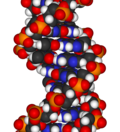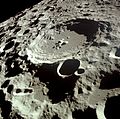Natural science
Natural science is a branch of science concerned with the description, prediction, and understanding of natural phenomena, based on empirical evidence from observation and experimentation. It can be divided into two main branches: life science (or biological science) and physical science. Physical science is subdivided into branches, including physics, chemistry, astronomy and earth science. These branches of natural science may be further divided into more specialized branches (also known as fields).
Overview[edit]
The natural sciences seek to understand how the world and universe around us works. There are five major branches: Chemistry, Physics, Astronomy, Earth Science, and Biology. The natural sciences are more focused on objective, empirical evidence, and have more specific goals than other sciences.
Branches of Natural Science[edit]
Physics[edit]
Physics is the study of matter and energy and the interactions between the two. Physics can also be defined as "that department of knowledge which relates to the order of nature, or, in other words, to the regular succession of events."
Chemistry[edit]
Chemistry is the study of chemicals and the changes they can undergo. Chemistry is often called "the central science" because it overlaps so much with the other sciences.
Astronomy[edit]
Astronomy is the study of the universe beyond the Earth's atmosphere. It includes the study of the physics, chemistry, and evolution of celestial objects, as well as observational and theoretical astronomy.
Earth Science[edit]
Earth Science is the study of the Earth and its neighbors in space. It is an exciting science with many interesting and practical applications.
Biology[edit]
Biology is the study of life and its processes. Biologists study all aspects of living things, including all the many different types of organisms on Earth and the processes in them that enable life.
See also[edit]
- Outline of natural science
- History of natural science
- Natural environment
- Natural history
- Natural philosophy
References[edit]
<references />
Ad. Transform your life with W8MD's Budget GLP-1 injections from $49.99


W8MD offers a medical weight loss program to lose weight in Philadelphia. Our physician-supervised medical weight loss provides:
- Weight loss injections in NYC (generic and brand names):
- Zepbound / Mounjaro, Wegovy / Ozempic, Saxenda
- Most insurances accepted or discounted self-pay rates. We will obtain insurance prior authorizations if needed.
- Generic GLP1 weight loss injections from $49.99 for the starting dose of Semaglutide and $65.00 for Tirzepatide.
- Also offer prescription weight loss medications including Phentermine, Qsymia, Diethylpropion, Contrave etc.
NYC weight loss doctor appointmentsNYC weight loss doctor appointments
Start your NYC weight loss journey today at our NYC medical weight loss and Philadelphia medical weight loss clinics.
- Call 718-946-5500 to lose weight in NYC or for medical weight loss in Philadelphia 215-676-2334.
- Tags:NYC medical weight loss, Philadelphia lose weight Zepbound NYC, Budget GLP1 weight loss injections, Wegovy Philadelphia, Wegovy NYC, Philadelphia medical weight loss, Brookly weight loss and Wegovy NYC
|
WikiMD's Wellness Encyclopedia |
| Let Food Be Thy Medicine Medicine Thy Food - Hippocrates |
Medical Disclaimer: WikiMD is not a substitute for professional medical advice. The information on WikiMD is provided as an information resource only, may be incorrect, outdated or misleading, and is not to be used or relied on for any diagnostic or treatment purposes. Please consult your health care provider before making any healthcare decisions or for guidance about a specific medical condition. WikiMD expressly disclaims responsibility, and shall have no liability, for any damages, loss, injury, or liability whatsoever suffered as a result of your reliance on the information contained in this site. By visiting this site you agree to the foregoing terms and conditions, which may from time to time be changed or supplemented by WikiMD. If you do not agree to the foregoing terms and conditions, you should not enter or use this site. See full disclaimer.
Credits:Most images are courtesy of Wikimedia commons, and templates, categories Wikipedia, licensed under CC BY SA or similar.
Translate this page: - East Asian
中文,
日本,
한국어,
South Asian
हिन्दी,
தமிழ்,
తెలుగు,
Urdu,
ಕನ್ನಡ,
Southeast Asian
Indonesian,
Vietnamese,
Thai,
မြန်မာဘာသာ,
বাংলা
European
español,
Deutsch,
français,
Greek,
português do Brasil,
polski,
română,
русский,
Nederlands,
norsk,
svenska,
suomi,
Italian
Middle Eastern & African
عربى,
Turkish,
Persian,
Hebrew,
Afrikaans,
isiZulu,
Kiswahili,
Other
Bulgarian,
Hungarian,
Czech,
Swedish,
മലയാളം,
मराठी,
ਪੰਜਾਬੀ,
ગુજરાતી,
Portuguese,
Ukrainian














